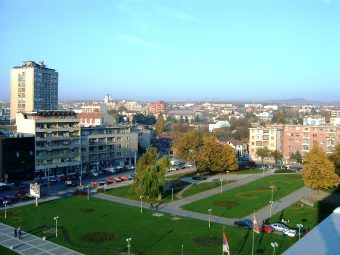
Kragujevac, the fourth-largest city in Serbia, will make a big leap in its transition away from coal, thanks to an EUR 18 million loan provided by the European Bank for Reconstruction and Development (EBRD) for the decarbonisation of the district heating system.
The EBRD loan will finance the decommissioning of coal boilers in the city’s district heating system, the installation of new natural gas boilers and the remediation of an open ash-disposal site. The financing will be complemented by technical support to the district heating company to help further decarbonise the heat supply and introduce renewable energy sources.
In coordination with the European Union, the EBRD will also support Serbia in the preparation of a national energy and climate plan. The plan will define goals for reducing emissions, increasing energy efficiency and boosting the share of renewable energy sources by 2030.
Matteo Colangeli, EBRD Regional Director for the Western Balkans and Head of Serbia, said: “We are pleased to support Serbia in advancing towards its green targets, particularly in the district heating sector. The EBRD has been working with the government on developing projects leading towards decarbonisation and the introduction of renewables in district heating systems and we hope that Kragujevac will be among the first of many cities in Serbia to reach these goals. The new project is addressing the urgent issue of air pollution and we expect it to pave the way towards the city’s greener and healthier future.”
Kragujevac suffers from very poor air quality, with the city’s district heating system one of the main sources of airborne pollution. Inefficient and dated coal-fired boilers are located near the city centre and cause severe damage to the environment. Air pollution is further exacerbated by an uncovered ash-disposal site, which not only emits airborne ash particles, but also contaminates soil and underground water.
More:
The EBRD loan will help completely eliminate coal from Kragujevac’s district heating system by replacing the coal boilers with new, natural-gas-fired hot water boilers that comply with EU standards, and by remediating the ash-disposal site. This is expected to have enormous environmental benefits, including reducing the heating system’s emissions of carbon dioxide by 66 percent, sulphur dioxide by 100 percent, nitrous oxide by 89 percent and particulate matter by 100 percent, along with water savings of 55 percent. The new boilers will also end the production of ash and slag and the related water contamination.
The EBRD is a leading institutional investor in Serbia. The Bank has invested more than EUR 6.6 billion across 286 projects in the country to date. The EBRD is focusing on support for private-sector development, the improvement of public utility services and on the overall transition to a green economy.
Source: EBRD



